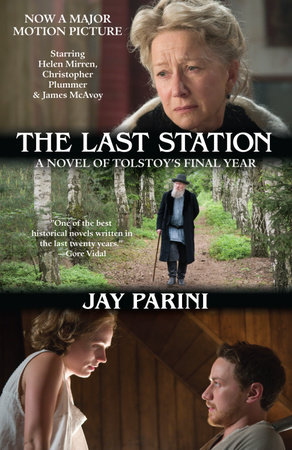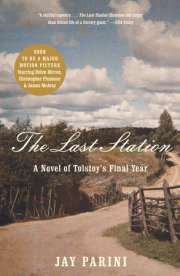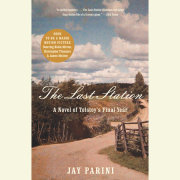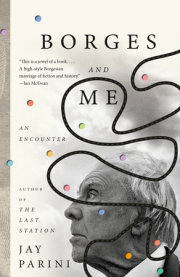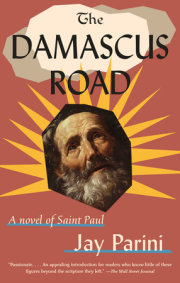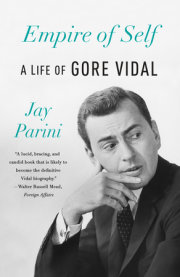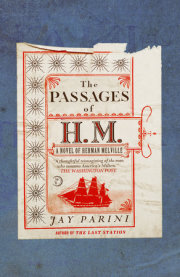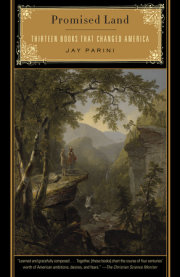1
SOFYA ANDREYEVNA
The year has turned again, bringing us to the end of the first decade of the new century. I write the strange numbers in my diary. 1910. Is it possible?
Lyovochka is asleep now, and he will not waken till dawn. A while ago, I was drawn by his rattling snore down the hall to his bedroom. His snore sounds through the house like a creaking door, and the servants giggle about it. "The old man is sawing wood," they say, right in front of me. They no longer respect me, but I smile back at them.
Lyovochka's snoring doesn't bother me, since we sleep in separate rooms now. When we slept in the same bed, he had teeth: they lessened the snore.
I sat on his narrow little bed and pulled the gray blanket with the key design up to his chin. He started, forcing a monstrous grimace. But he didn't waken. Almost nothing wakes Leo Tolstoy. Whatever he does, he does completely: sleep, work, dance, ride, eat. They write about him constantly in the press. Even in Paris, the morning papers adore tidbits of gossip about him, about us--true or untrue, they don't care. "What does Count Tolstoy like for breakfast, Countess?" they ask, lining up on the front porch for interviews throughout the summer months, when the weather in Tula makes this a pleasant destination. "Does he cut his own hair? What is he reading now? Have you bought him a present for his name day?"
I don't mind the questions. I give them just enough to send them happily on their way. Lyovochka seems not to care. He doesn't read the stories anyway, even when I leave them on the table beside his breakfast. "They are of no interest," he says. "I don't know why anyone would care to print such rubbish."
He does, however, glance at the photographs. There is always a photographer here, snapping away, begging for portraits. Chertkov is the most troublesome. He thinks himself an artist with the camera, but he is just as foolish with that as with everything.
Lyovochka slept on, snoring, as I smoothed his hair. The white hair that tumbles on his starchy pillow. The white beard like spindrift, a soft spray of hair, not coarse like my father's. I spoke to him as he slept, called him "my little darling." He is like a child in his old age, all mine to coddle, to care for, to protect from the insane people who descend upon us daily, his so-called disciples--all led on, inspired, by Chertkov, who is positively satanic. They think he is Christ. Lyovochka thinks he is Christ.
I kissed him on the lips while he slept, inhaling his babylike breath, as sweet as milk. And I remembered a bright day many years ago, when I was twenty-two. Lyovochka's beard was dark then. His hands were soft, even though he spent a fair amount of time with the muzhiks, working in the fields beside them, especially at harvest. He did this for recreation, really. For exercise. It was not so much a point of honor then, as it would be later, when he liked to imagine himself, at heart, one of the noble muzhiks he adores.
He was writing War and Peace, and every day he would bring me pages to recopy. I do not think I have ever been happier, letting my hand darken those pages, letting the black India ink summon a vision as pure and holy as any that has ever been seen or dreamt. Nor was Lyovochka ever happier. He has always been happiest within his work, dreaming his grand, sweet dreams.
Only I could read Lyovochka's handwriting. His crablike hieroglyphs filled the margins of his proof sheets, driving the printers wild. Corrections blotted out corrections. Even he could not make out what he had written much of the time. But I could. I read his intentions, and the words came clear. In the afternoons, drinking linden tea, we would sit for hours by a peat fire, discussing changes. "Natasha would never say such a thing to Prince Andrey," I would tell him. Or "Pierre is too simple-minded here. He is not as stupid as he pretends." I would not let him write badly. Nor would I let him drowse in his study or spend too much time on horseback or in the fields. Lyovochka had more important work to do. I drove him to his desk. I was important to him.
But I do not matter now.
Not like in those early years, as on my name day, September 17, when I was twenty-two, as slender and beautiful as a daffodil.
We had three children then. Taking care of them, looking after the entire estate (Lyovochka has never been good with details or management--not then, not now), and copying his manuscripts, my days were exhaustingly full. But I did not complain, even when he spent endless hours chatting in his study with that silly bluestocking Marya Ivanovna, who had attached herself to him like a limpet.
I knew she would not last. Of all the women in his life, only I have lasted. They could not wear me down, and they will not.
That was in 1866. I remember because it was the year our blessed tsar, Alexander, was saved by the hand of God. A miracle. He had been taking his daily walk in the Winter Garden when a deranged youth (from a well-known family, alas) fired at him with a pistol. The quick hand of a muzhik saved the tsar, dashing the gun to one side.
That same night, in Moscow, Lyovochka and I attended the theater, as we often did in those days. The performance began with everyone in the audience standing to sing "God Preserve the Tsar!" I have never seen such weeping! For weeks after, I gave thanks at special masses held in the Chapel of St. Nicholas, near the Kremlin. Russians needed their tsar then. They need him now, though one would never know it listening to my husband and his friends. It is a wonder the police haven't silenced them. If Lyovochka weren't as powerful as the tsar himself, I dare say they would.
Of course, Lyovochka won't hear me on this subject. He despises the tsar, on principle. But in our early days together he was a monarchist, too. He worshiped Alexander, who had freed his cousin, Major-General Prince Volknosky, who had been one of the Decembrists sent to Siberia by Nicholas I. His wife, the princess, had gone into exile with them, leaving behind a small child.
On that name day, long ago, the late-summer light fell slantwise through the yellow birches. I spent the morning by myself, wandering in Zasyeka Wood, smelling the rich earth, the late-blooming flowers. One maple, to my surprise and horror, was already scarlet, lit like a bell in a strange light. I stood beneath it, unable to control my tears.
Lyovochka appeared from behind the tree. In a white blouse, looking more like a muzhik than a nobleman, he dazzled me with his stare. Such intensity! Had he followed me here?
"Why these tears, my little Sonya? What's wrong?"
I bit my lip. "Nothing," I said.
"Nothing?" he said. "Something."
"This tree," I said. "Look! Already the leaves have turned. Soon the whole wood will be bare."
I could hardly tolerate the winters in Tula, then or now. There is no escaping the cold, the blue wind and snow. The trees, with their black branches, crowd my mind. I find it impossible to think.
"You aren't crying because of this red tree," he said. "You are crying for Sonya."
I protested. Wasn't it my name day? Wasn't I the luckiest woman in all of Russia, to have married the most promising writer of his generation, to have three small, beautiful children and a large house in the country?
But he was right, of course. I wept for Sonya.
That night the servants prepared an elegant early dinner on the terrace, setting a table in the late-afternoon sun. My sister Tanya had brought a lovely pheasant pate from Moscow, which she served on a cool cipolin platter--a gift from Mama. There was black bread fresh from the oven. There were large wet grapes in white bowls, with oranges from the south in red bowls. And borscht and, later, duck in a Parisian glace. There was lamb, too, and a bit of goose. Sweet cakes of bran and honey tumbled from a basket. Lyovochka poured the wine, much more of it than anyone should have drunk!
A number of young officers from the Tula regiment appeared, in smart dress uniforms with silver buttons. Lyovochka did not hate the military then. His years in the army were not so far behind him then, or his memory of the Caucasus. He would lie beside me in bed, telling me about Prince Gorchakov and the siege of Silistra. I treasured those nights, those stories. And I miss them, as I miss the young officers who ate, so often, at our table.
We gathered about the long table with its crisp linen tablecloths and English china. The crystal caught the sunlight and sparkled with a brightness that was almost painful. "Today is the Feast of the Martyrs," Lyovochka told the assembled company, proposing the toast. "The Blessed Martyrs," he said, correcting himself, as one or two of the officers chuckled. "There is Vera, whose name is Faith. And Nadezhda, who is Hope, and Lyubov, which means Charity. Their mother is Sofya, meaning Wisdom. To thee, my Sofya, source of all wisdom, love of my life...." Glasses clinked. I bowed my head, determined not to weep.
From the garden, well hidden by trees and bushes, came the gay strains of my favorite opera, La Muette de Portici. Lyovochka rushed to my side, drawing me into his arms for a brief public display of strong affection. I could feel the pressure of their eyes upon us as we kissed. But I did not mind. "Just one dance--before dinner?" Lyovochka asked me. I dipped my eyes, shyly, to the floor, but I danced beautifully in those days, before my knees were stiffened by too many damp mornings in the country.
Over his shoulder, I saw that Marya Ivanovna was looking into her empty plate. This occasion, I think, ended her little obsession with my husband. It was a lance thrown into her chest by Lyovochka himself!
After dinner, the real dancing began. Only the aged aunts and their wizened friends refused to join us whirling on the stone terrace, spinning in celebration of the Martyrs.
Lyovochka insisted, as always, on the kamarinskaya, a dance with intricate, quick steps. A few tried to sit it out, but he would have none of it. Lyovochka was the ringmaster, driving us--especially the younger officers--into ever more wild and lavish gestures.
Long before the others left, I was led by Lyovochka to the bedroom. Our abrupt departure was almost embarrassing, but I didn't mind. One of the young officers caught my eye as we left; I knew what he was thinking, and it terrified me slightly.
Before I could even undress, Lyovochka was kissing me frantically on the neck and shoulders. I lay back on the broad bed and let him do what he had to do. It was not unenjoyable then, as it would become. Soon his trousers were down about his knees. I closed my eyes when his large red hands reached under my dress, the flat palms pressing hard on my nipples. And I let him take me, as he would, quickly. I wished he understood about these things, but I could not tell him. I let him fall asleep, half dressed, nuzzling into my shoulder.
When the dawn broke over Zasyeka Wood, he was gone. He had taken himself, as usual, to his study. I found him there later, his lips pursed, the candle still burning in the daylight. His quill dug deep letters in the page; his eyes flickered with a wild energy that I loved. He did not notice me, even when I put my hands on his shoulders and breathed, softly, on the back of his broad, white neck.
2
BULGAKOV
"But sex?" asked Chertkov, rubbing his forehead with the palm of a hand disfigured by eczema. "You are only twenty-four." He leaned forward across the desk. "Not an easy age for abstinence."
I withdrew the smile that had formed on my lips against my will. Vladimir Grigorevich Chertkov has no sense of humor. Apart from his plumpness and bad skin, this humorlessness is the most noticeable thing about him.
"I know that Count Tolstoy does not approve of sexual relations."
"He despises them," Chertkov replied. "And, if I may advise you, he does not use his title. He renounced it years ago."
Chertkov unnerved me. I felt uncomfortable not using Tolstoy's title. I had been brought up in polite company, taught to defer to those with power. It annoyed me that Chertkov imagined I wouldn't know about the renunciation of that title. I know practically everything about Tolstoy that can be learned from his writings, and much else besides. There is a thick smoke of gossip surrounding the name of Leo Tolstoy, and I had inhaled that smoke on every possible occasion.
"You must call him Leo Nikolayevich, like the rest of us," Chertkov added. "He prefers that."
Chertkov's chameleonlike skin puffed loosely about his bald, pear-shaped head. I could almost see through his forehead to the frontal lobes of his brain. He spoke stiffly, tapping his puffy fingers on the bare table. "I take it you have read The Kreutzer Sonata?"
I nodded, though I hoped we would not discuss this particular work. The Kreutzer Sonata is Tolstoy's one failure, as I see it. Is there anything in common between Pozdnyshev, the hero of that tale, and Leo Tolstoy? I cannot believe it. It's the story of a man who murders his wife. Many readers--I don't go this far myself--consider it a tract against marriage, a missile of hate, a vile book. It is so unlike Anna Karenina, where Tolstoy celebrates the marriage of Kitty and Levin, raises it like a banner across the cold Russian sky. But Pozdnyshev!
"I don't want to belabor the point of chastity, but I arranged for a servant last year who proceeded to ruin two young housemaids who had been with the Tolstoy family for many years. It upset Leo Nikolayevich terribly. I want to make it clear that this won't be a problem."
I shook my head in outward assurance but inwardly was horrified that I should be classified with a servant. I think my anger showed in my cheeks. I tried to cover them with my hands.
"I'm sorry to bring up a delicate subject," Chertkov said. "One can never be too specific, I always say."
Copyright © 2009 by Jay Parini. All rights reserved. No part of this excerpt may be reproduced or reprinted without permission in writing from the publisher.

